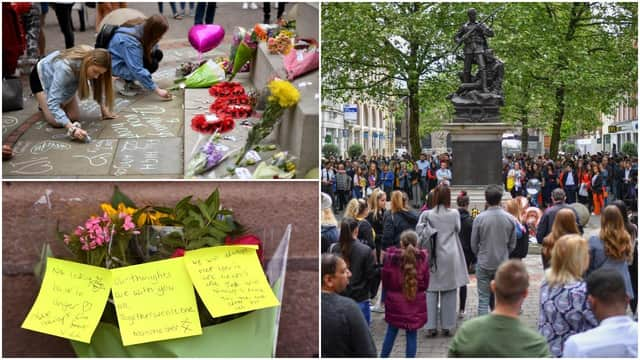When was the Manchester bombing? What happened at Arena in 2017 as inquiry into attack publishes first report


Security failings on the night of the Manchester Arena bombing led to multiple “missed opportunities” before the terror attack happened, an inquiry has found.
Sir John Saunders, who is chairing the probe into the 2017 atrocity, said suicide bomber Salman Abedi should have been identified as a threat by those in charge of security.
Advertisement
Hide AdAdvertisement
Hide AdHe said it was likely Abedi would have set off the bomb if confronted but "the loss of life and injury is highly likely to have been less".
In 2017, 22 people were killed and hundreds were injured in the bombing carried out by Abdei at the end of an Ariana Grande concert.
Hearings at the public inquiry into the circumstances surrounding the attack have been ongoing since September 2020.
Retired High Court judge Sir John will issue his findings in three volumes, starting with the report looking into the security operation, followed by one on the emergency response and an analysis on whether the attack could have been prevented.
Here’s what we know about what happened on the night.
When was the Manchester Arena bombing?
The atrocity happened on 22 May 2017, at the very end of a performance by US singer Ariana Grande.
As crowds were leaving the venue and making their way home, Abedi, 22, set off a home-made bomb in the foyer just after 10:30pm.
Witnesses described hearing an explosion and seeing a flash of fire, while the blast blew people off their feet.
Pictures of the aftermath of the attack showed metal nuts and bolts strewn among casualties in the foyer area of the Arena, which is the busiest exit from the venue.
Advertisement
Hide AdAdvertisement
Hide AdAfter the bomb was detonated, people were sent into a panic and started fleeing down the stairs from the foyer into the adjoining Victoria Station.
How many people died in the attack?
Twenty-two people died in the terror attack, including schoolchildren and parents.
The youngest victim was eight-year-old Saffie Roussos, from Leyland, Lancashire.
Scottish teenager Eilidh MacLeod from Barra, in the Outer Hebrides, was only 14 when she died in the terror attack.
In total, 116 people were admitted to hospital after the bombing.
More than 240 emergency calls were made on the night, and 60 ambulances and 400 police officers were in attendance.
Who carried out the bombing?
Manchester-born Abedi, of Libyan descent, was named by police as the suicide bomber shortly after the attack.
One of three siblings, the family lived at numerous addresses in the city, including properties which were raided by police officers.
Advertisement
Hide AdAdvertisement
Hide AdThe attacker attended Burnage Academy for Boys in Manchester, before he went to study at The Manchester College and then Salford University.
He was arrested for minor offences in 2012 but was not known to the government’s Prevent scheme.
On the night of the bombing, Abedi, dressed in black, walked across the foyer of the venue towards the main doors, where he detonated the device which was stuffed into his heavy rucksack.
The inquiry into the attack was told he made three trips to the venue before his last journey when the bombing was carried out.
Security experts considered that he may have noticed a CCTV blackspot within the Arena.
Abedi waited upstairs for nearly an hour before he walked down to the foyer and set off the device.
Guards working at the Arena on the night told the inquiry that people had warned them about the man with the large backpack at the venue, but problems with their radios meant they were unable to report the concerns to their control room.
The inquiry also heard that the foyer where the bomb was detonated wasn’t patrolled by police officers, according to the orders they’d been given.
